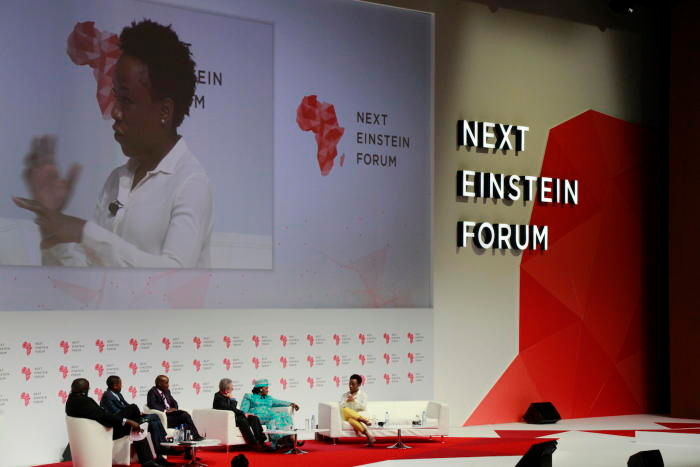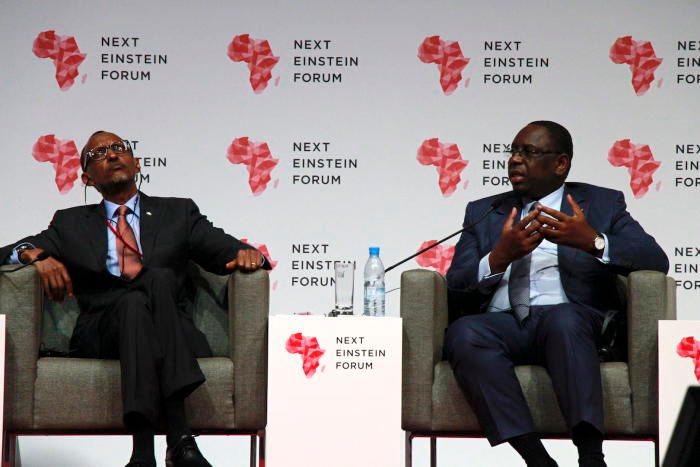HOW CAN WE REALLY BRING STEM TO AFRICA? MORE IDEAS THAN ACTIONS AT #NEF2016
- Mel Bailey
- Jun 7, 2018
- 4 min read

“It’s wrong to say African scientists have to only solve African problems. African scientists should help the world.”– David Sengeh of Global Minimum
“Why do we have to import things, why not just make things in Africa for Africans”–Mariéme Jamme, investor, mentor, CEO, and activist
“We already initiated scholarships in general, we need scholarships in science and technology.”– Senegalese President Macky Sall
Physicist, chemists, etymologists, and actual rocket scientists from around the world came together at the Next Einstein Forum in Dakar, Senegal to discuss Africa’s future in science and technology. At this year’s forum, 15 of Africa’s most elite young scientists discussed their findings and shared their proposals for a pathway to excellence. But many questions remain on plans to turn these ideas and well-intentioned hopes into actions that will result in lasting changes.
Conversations on the importance of increasing programs focused on science, technology, engineering and mathematics (STEM) education may not be new, but on the continent, partnerships like the one between the African Institute of Mathematical Science (AIMS) and Germany’s Robert Borsh foundation are beginning to push those conversations beyond the laboratory and out into the public.
These type of public partnerships that have the potential to drive more actionable discussions are something education activist and CEO at SpotOne Mariéme Jamme said, are essential to Africa’s advancement.

“It’s not perfect, but we need to have this conversation and I think the NEF created this conversation and is giving us access to have this conversation is actually very crucial, so it is one step at a time”– Mariéme Jamme
Managing director of the Next Einstein Initiative, Arun Sharma, said the entire goal of the forum is to change the idea that the world has about ‘African Science’.
“When we first started this project we found, there is this perception within Africa and globally that African science means something else, it’s not science. So our mission in the very long term and very broadly, is to change that. We want people to work with Africa and look at Africa as a contributor to the world of science.”– Arun Sharma
As part of its mission, the NEI says it is also committed to gender equity across the sciences. In 2016, women hold 40% of all fellow and ambassador positions within the program, something, Jamme said may look great but without a clearly constructed methodology, may not be possible to replicated in other STEM programs across the continent.
“Having a very clear methodology where we give girls, even vulnerable girls from slums to refugee camps to detention centers, in markets of Dakar to Kinshasa, girls need to have access to education just like boys, and I think we need to create opportunities for girls. My whole part of the project is just that.”– Mariéme Jamme
As an independent activist, Jamme has launched several projects and campaigns that teach young girls how to code and help them discover a personal interest in technology. She said she feels it’s time for more individuals to take responsibility and help local governments, because as she said, “we simply can’t leave everything in their hands.”

The Association for the Development of Education in Africa (ADEA) pledged to assist the NEI mission by working with governments to find investors and provide training for teachers in STEM subjects in all 54 countries on the continent.
With investors, ministries of education, policy makers, and scientists who have succeeded and are the exception to the current norm all present, there was a lot of talking about improvements to STEM programs, But talk is one thing and acting to change how science is seen and practiced on continent may be another.
“One of the perceptions we want to change that science can’t be done in Africa and some of our strongest detractors are on the continent today. We need to change that. It’s not true, scientists are equally distributed. There are good scientists and there are bad scientists but they are equally distributed around the world. There is this perception that if it comes from the US it must be great, that good science can only be done outside of Africa, and it’s false we have to change that perception. We have to change it today and we have to change it with our young people, and I think it’s very much a cultural shift”.– Arun Sharma
The idea science is something “so western”, or that it isn’t a “safe” career choice exists in too many places across the continent, especially when applied to the education of women. Tradition and culture too often say that women should remain at home and care for their family. And for too many of all African citizens living outside of its capital cities, access to science and technology is almost unheard of.
Across Africa, less than 1% of every country’s GDP is allocated toward STEM subjects (World Bank, PDF) in education or research. Many students, even at the university level, have never had any form of computer science education.
But change is happening and opportunities are becoming more available. While there are many questions still remaining about whether real change that can impact a majority of the continent’s population can happen, those in Dakar taking part in this year’s Next Einstein Forum, said they see those changes happening and belive the world is beginning to recognize Africans’ contributions in the sciences
“I want to change the perception from collaborating because people need help to collaborating on the basis of excellence, and those at this forum are here to collaborate based on excellence,”– Arun Sharma managing director of the Next Einstein Initiative
LEARN MORE ABOUT #NEF2016
Follow updates from the Next Einstein Forum on Twitter,@NextEinsteinFor or like their page on Facebook page and check out hashtag #NEF2016.

Comments